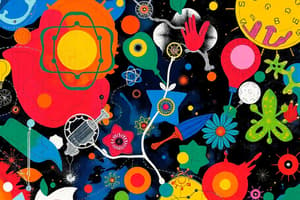Podcast
Questions and Answers
Which branch of science focuses on human behavior and societies?
Which branch of science focuses on human behavior and societies?
- Applied Sciences
- Formal Sciences
- Social Sciences (correct)
- Natural Sciences
A theory in science is simply a guess or assumption.
A theory in science is simply a guess or assumption.
False (B)
What is the first step in the scientific method?
What is the first step in the scientific method?
Observation
In an experiment, the ________ group does not receive the treatment being tested.
In an experiment, the ________ group does not receive the treatment being tested.
Match the following branches of science with their focus area:
Match the following branches of science with their focus area:
Study Notes
Overview of Science
- Science is the systematic study of the natural world.
- It aims to understand and explain phenomena through observation and experimentation.
Branches of Science
-
Natural Sciences
- Focus on the physical world and its phenomena.
- Subdivisions include:
- Physics: Study of matter, energy, and the fundamental forces.
- Chemistry: Study of substances, their properties, and reactions.
- Biology: Study of living organisms and life processes.
-
Formal Sciences
- Study of mathematical systems and logical reasoning.
- Key fields include:
- Mathematics
- Statistics
- Computer Science
-
Social Sciences
- Study of human behavior and societies.
- Key areas include:
- Psychology: Study of the mind and behavior.
- Sociology: Study of social behavior and structures.
- Anthropology: Study of cultures and human evolution.
-
Applied Sciences
- Practical application of scientific knowledge.
- Examples include:
- Engineering: Application of physics and materials science.
- Medicine: Application of biology and chemistry for health.
Scientific Method
- A systematic approach to research.
- Steps include:
- Observation: Gathering information and noticing patterns.
- Question: Formulating questions based on observations.
- Hypothesis: Proposing explanations or predictions.
- Experimentation: Testing hypotheses through controlled experiments.
- Analysis: Interpreting data and determining results.
- Conclusion: Summarizing findings and determining if they support or refute the hypothesis.
- Communication: Sharing results with the scientific community.
Key Concepts in Science
- Theory: A well-substantiated explanation of an aspect of the natural world, based on a body of evidence.
- Law: A statement that describes an observable phenomenon but does not explain why it occurs.
- Variable: Any factor that can be changed in an experiment.
- Control Group: The group in an experiment that does not receive the treatment being tested; used for comparison.
Importance of Science
- Drives technological advancement and innovation.
- Enhances understanding of the universe and human existence.
- Provides solutions to societal challenges, including health, environment, and energy issues.
- Fosters critical thinking and informed decision-making.
Overview of Science
- Science systematically studies the natural world through observation and experimentation.
- It aims to understand and explain phenomena.
Branches of Science
- Natural Sciences focus on the physical world and its phenomena.
- Physics studies matter, energy, and fundamental forces.
- Chemistry studies substances, their properties, and reactions.
- Biology studies living organisms and life processes.
- Formal Sciences study mathematical systems and logical reasoning.
- Mathematics
- Statistics
- Computer Science
- Social Sciences study human behavior and societies.
- Psychology studies the mind and behavior.
- Sociology studies social behavior and structures.
- Anthropology studies cultures and human evolution.
- Applied Sciences apply scientific knowledge to practical applications.
- Engineering applies physics and materials science.
- Medicine applies biology and chemistry for health.
Scientific Method
- A systematic approach to research with several steps:
- Observation: Gathering information and noticing patterns.
- Question: Formulating questions based on observations.
- Hypothesis: Proposing explanations or predictions.
- Experimentation: Testing hypotheses through controlled experiments.
- Analysis: Interpreting data and determining results.
- Conclusion: Summarizing findings and determining if they support or refute the hypothesis.
- Communication: Sharing results with the scientific community.
Key Concepts in Science
- Theory: A well-substantiated explanation of an aspect of the natural world based on a body of evidence.
- Law: A statement describing an observable phenomenon without explaining why it occurs.
- Variable: Any factor that can be changed in an experiment.
- Control Group: The group in an experiment that does not receive the treatment being tested; used for comparison.
Importance of Science
- It drives technological advancements and innovation.
- It enhances understanding of the universe and human existence.
- It provides solutions to societal challenges, including health, environment, and energy issues.
- It fosters critical thinking and informed decision-making.
Studying That Suits You
Use AI to generate personalized quizzes and flashcards to suit your learning preferences.
Description
This quiz provides an overview of science, focusing on its systematic study of the natural world. It covers the key branches of science, including natural, formal, social, and applied sciences with definitions and examples. Test your understanding of these fundamental concepts in science.




